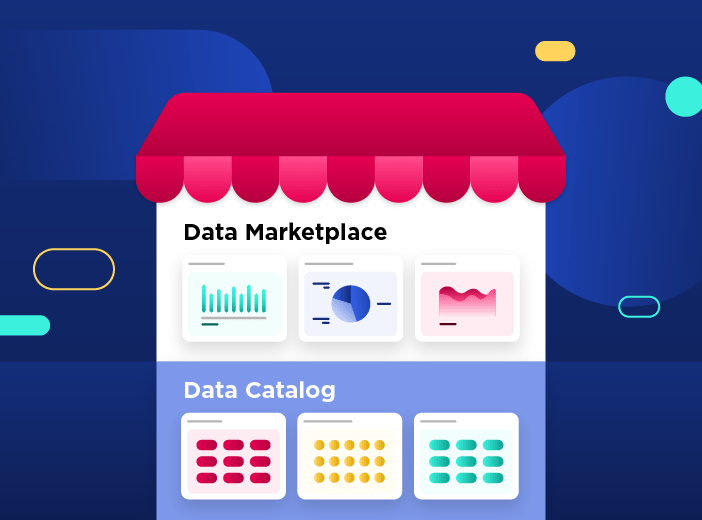Glossary
Data catalog
A data catalog is an inventory of all data within an organization. This enables internal and external users to easily find and access information.
With ever-increasing volumes of data, it is essential that datasets are easy to find, access and use. However, data is often scattered across an organization’s systems and storage solutions or only available in its raw form in expert tools. Organizing data through a data catalog overcomes this challenge, ensuring accessibility to internal and external users.
What is a data catalog?
A data catalog is an inventory of all data in an organization. Its objective is to allow everyone inside and outside the organization to easily find, access and use information. It includes features such as filters, themes and data search to make finding the right dataset simple and straightforward. Data catalogs enable data democratization by ensuring users can find the right data for their needs.
At a topline level a data catalog follows the same principles as a library catalog, which allows readers to find the location of a specific book, by searching or browsing using its title, author or subject.
To be effective a data catalog must:
- be updated regularly
- contain comprehensive quality data
- offer tools to make searching for data straightforward without requiring technical training
- provide ways to easily reuse the data
- be available to all users, inside and outside the organization
Why use a data catalog?
Organizations generate huge volumes of data. However this is often scattered across the organization or stored in raw form in expert tools, meaning it is not easily accessible to all employees. The data catalog overcomes this challenge. It enables users to search and find relevant information just as they would using an online search engine.
Implementing it is therefore an essential step to democratizing data in your organization, with multiple benefits:
- Accessible data: the catalog allows everyone to access information freely.
- Time savings: by simplifying access to data, the catalog saves time for employees. They can find what they need much more quickly.
- Better decision-making: With more reliable, high-quality data, employees and management alike can make better-informed decisions
- Improved user experience: Whether they are data experts or not, users will be able to identify useful data more quickly and incorporate it into their working or daily lives.
How do you design it?
It must include several elements:
- Metadata: metadata is data about data. It describes what a dataset contains, and therefore simplifies the understanding and organization of information. It is vital that metadata is comprehensive and complete to provide full background on a dataset and make it easier to find.
- Search options: to simplify access to data, the catalog must have a search function and filters to enable users to quickly find what they are looking for.
- Standardization: Very often, data formats and sources are heterogeneous, coming from different business applications, databases and storage solutions. They must harmonize data to make it usable.
- Automation: in order to ensure that data is always up to date, the catalog must be updated in real-time with the latest information and datasets..
- Tools to reuse data: Improving data accessibility aims to encourage data reuse. It is therefore essential to provide tools to visualize or download data, such as via APIs.
With Opendatasoft, you can create your data catalog very easily. The platform provides powerful search functions to aid discoverability and compelling data visualizations to aid sharing. Organizations can easily control who has access to which datasets, and can create dedicated sub-domains for different projects or business areas.
Learn more

Blog
10 tools that enable Chief Data Officers to drive greater value from their data
As Chief Data Officer (CDO), you lead and shape your organization's data strategy. However, given the increasing complexity of data flows, evolving regulations and the growing pressure to generate value from data, your tech stack needs to be comprehensive and robust.

Blog
Data marketplace and data catalog: which should you choose to maximize data access across your organization
Today’s enormous growth in data volumes brings a new challenge for businesses – how can they harness and use this data at scale? Organizations are therefore looking for solutions that can transform their data assets by making them available and useful, accelerating and improving performance to benefit the entire business.

Blog
What is a data catalog?
Organizations now generate an enormous range of data assets across their operations and departments. Harnessing this data successfully starts with understanding what data is available and where it is located through centralized data catalogs. This blog explains what they are and how they can benefit businesses.
